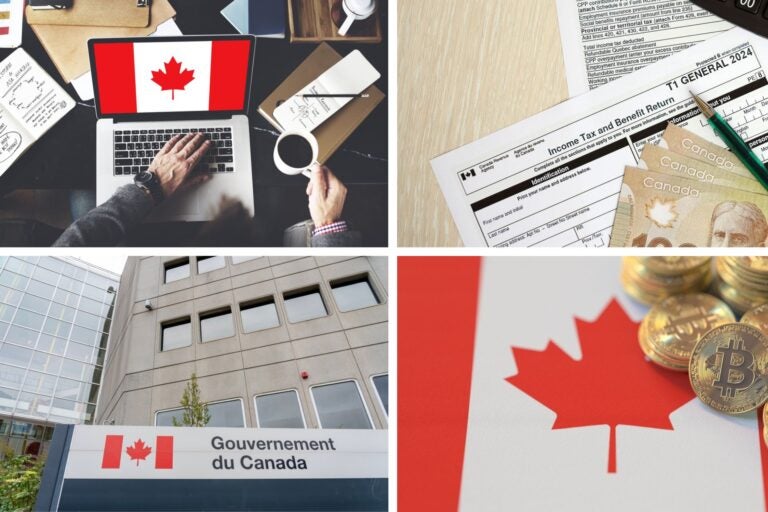Learn all about taxes in Canada: What should you pay?
Do you want to live in a safe country with great job opportunities? Here you will find an explanation about taxes in Canada for expats.
Would you be interested in relocating to Vancouver, Ottawa, Montreal, or another city in Canada? If you’re planning to start a new career or pursue studies here, it’s important to be aware of the country’s taxes for expats. Knowing your tax responsibilities will help you make the most of Canada’s financial system and contribute to the country’s strong foundations in education, healthcare, and technology.
Canada’s tax system also offers benefits and exemptions that you may be eligible for, depending on your situation. Keep reading to get a clear understanding of the mandatory taxes and learn how to reduce them through government programs designed to ease the tax burden and attract talented individuals from abroad.
Types of expats in Canada
Canada attracts people from all over the world, each with their own goals—whether they’re employees, freelancers, digital nomads, students, entrepreneurs, investors, or retirees. One of the main reasons for this cultural diversity is the country’s strong sense of security, abundant job opportunities, highly regarded universal healthcare system, and exceptional quality of life.
Given the wide range of industries in Canada, it makes sense that taxes for expats vary depending on their personal and professional circumstances. Let’s break it down into three categories: individuals, businesses, and property.
Individuals
An individual refers to anyone who comes to Canada to work, whether as an employee or self-employed. This includes digital nomads, who can legally work remotely for a set period thanks to Canada’s digital nomad visa. Students also fall into this category—whether they come to pursue higher education, specialize in a field, or learn a language like English or French. Lastly, retirees are another group drawn to Canada for its safe environment, peaceful lifestyle, and stunning natural surroundings. Here’s a summary of these groups:
- International students: Canada is home to prestigious universities, especially in cities like Vancouver and Toronto, and many students can obtain work permits after graduating. It’s also a top destination for language studies, where students can live with a Canadian host family for a full cultural and linguistic immersion experience.
- Foreign workers: There are plenty of job opportunities in healthcare, education, technology, and construction. To attract skilled professionals from abroad, the Canadian government makes it easier to obtain work permits.
- Immigrants and refugees: Canada has one of the world’s most welcoming immigration policies. It provides opportunities for those looking to work in the country and offers refuge to individuals fleeing conflict in their home countries.
- Temporary residents: This group includes tourists traveling to discover Canada’s landscapes, short-term workers and researchers.
- Retirees: The majority of retirees who decide to establish their residence in Canada come from the United States, gaining in security and healthcare system.

Companies or properties
Canada is also a hotspot for startups looking to establish themselves and multinational companies opening new branches in major cities, largely due to its proximity to the U.S. market. Additionally, the country is a prime destination for real estate investors, especially those focused on rental properties. Taxes for foreign businesses and property owners differ from those applied to individuals. Here are the main types of foreign companies operating in Canada:
- International companies: The Canadian government has introduced various incentives, such as the USMCA trade agreement, to support businesses in setting up operations and boosting their economic growth.
- Entrepreneurs: Startups or small companies, especially those investing in technology, have it easy to start their project.
- Real estate properties: Cities like Toronto, Vancouver, and Montreal have a high demand for both rentals and property purchases, which is why many foreigners choose to invest in Canada’s real estate market.
- Agricultural or industrial projects: With its abundance of natural resources, Canada draws foreign investment in sectors like agriculture, mining, and energy. For example, Manitoba is famous for grain farming, Alberta plays a key role in the energy industry, and Quebec is renowned for its iron mining.

Taxes for foreign individuals in Canada
Individuals are required to contribute to the country’s tax system and pay taxes based on their residency status and income level. Here are the main taxes for foreign residents:
- Income tax: This tax applies to income earned within the country for non-residents. Residents, on the other hand, are taxed on their worldwide income. Federal tax rates start at 15% for income up to C$53,359 ($37,044) and can go up to 33% for income over C$235,675 ($163,619).
- Goods and services tax (GST/HST): This is an indirect tax that affects foreigners through the cost of living, based on the goods and services they purchase in the country. The rates range from 5% to 15%, depending on the province.
- Employment insurance and CPP contribution: Foreigners earning income in the country must contribute to Employment Insurance (EI) and the Canada Pension Plan (CPP), based on their employment earnings.
Important: If you are a frequent traveler and want to stay connected without worrying about expensive roaming or looking for a new SIM at every destination, Holafly’s subscription plans are for you. With a single eSIM, enjoy internet in more than 170 countries for a fixed price and no surprises on your bill. travel without limits and connect easily and securely! 🚀🌍

Fiscal or tax benefits for expats in Canada
Canada also has a tax benefit program for expats, which can help lower mandatory taxes and ease the transition when moving to a new country. If you’re considering living in Canada, here are some of the tax advantages the country offers:
- Tax credits: Tax credits are available for expats that directly reduce their overall tax bill. These can include basic credits, as well as credits for education and work.
- Tax treaty exemptions: It provides exemptions or tax reductions through double taxation agreements that Canada has with several countries. This helps prevent taxing expats on the same income in both their home country and Canada.
- Deductions for employment and educational expenses: Depending on the individual’s personal or work situation, certain expenses, such as tuition fees or professional training courses, may be deductible.
Taxes for foreign properties or companies in Canada
In the previous section, we discussed taxes for expats in Canada, focusing on individuals. However, businesses and property owners are also required to report their income and pay taxes. This helps regulate the real estate market and generates revenue for local governments. If you’re a business owner or investor, here’s what you need to know:
- Real estate tax: This is an annual tax, and the rate depends on where the property is located. For example, in Vancouver, the tax is 3% of the property’s assessed value. There are also property taxes on buying or selling, which vary by province and municipality. In these cases, you must report 50% of the profits.
- Business income tax: Businesses are required to report their earnings in the country, subject to a federal tax rate of 15%. On top of that, each province applies an additional tax rate ranging from 8% to 16%, depending on the location.
Tax benefits for foreign companies in Canada
Canada’s strategic location, with its proximity to the United States and Mexico, makes it an attractive prospect for many businesses. As a result, the government has created a range of tax incentives to promote a dynamic and business-friendly environment for foreigners. Here are the most important ones:
- Deduction for rental income: For non-residents, there is an option to report the net rental income instead of paying a fixed 25% tax on the gross income.
- Credits for historical maintenance: If the property you purchase has historical or cultural value, you may be eligible for tax deductions and credits to help with its preservation.
- Incentives for foreign investment: If you own a foreign company that invests in technology, renewable energy, or rural development, the government will offer a range of incentives.
- Research and development (R&D) tax credits: For innovation research projects, you can receive significant tax credits, refunds, and fee reductions.

Taxation of foreign investments in the Canadian stock market
Along with workers, students, retirees, and businesses, investors are another group that must pay close attention to taxes in Canada. Those interested in investing in the Canadian stock market, thanks to its economic stability, are also required to report their earnings. It’s essential to understand the tax rules regarding bonds, stocks, and other financial instruments in the country. Here are the main taxes and benefits for stock market investors:
| Taxes/Benefits | Features | Rates |
| Tax on dividends | Profits earned on dividends from Canadian companies | Standard rate of 25% |
| Capital gains tax | Gains obtained from the sale of domestic companies | Depends on the type of investment |
| Withholding tax on interest | Interest earned on corporate or governmental bonds | Rate of 25% (reductions and exemptions may apply) |
| International tax treaties | Agreements to avoid double payment of taxes | Rate reduction to 15%. |
| Exemption on public bonds | Certain Canadian government bonds are tax exempt | Exemption |
| Registered investment accounts | Tax-advantaged investment accounts such as RRSP (Registered Retirement Savings Plan) | Rate reduction |
Frequently asked questions about taxes for expats in Canada
Yes, all expats must pay taxes in Canada on income earned within the country. This can include earnings from work, rental income, property sales, or investments. The tax rates may be lower depending on the agreements Canada has with your home country.
Canada has signed over 90 double taxation agreements with other countries. These treaties aim to prevent individuals from paying taxes twice in different jurisdictions. The main benefit of these agreements is the reduction or exemption of certain taxes.
If you are an expat and you rent or sell a property in Canada, you must declare the profits obtained.
Yes, non-residents must report the income and earnings they generate within the country. However, they are not required to pay taxes on their worldwide income from other countries. For income tax, the rate ranges from 15% to 33%, depending on their earnings.
The Canadian tax authorities require anyone investing in the stock market to pay taxes on their profits and dividends. The standard withholding tax rate is 25%, but it can be lower depending on the relevant treaties.
Failing to report your income or earnings is both a legal and financial violation. The Canada Revenue Agency (CRA) investigates such cases, imposes penalties, and charges interest on any undeclared amounts. In cases of suspected tax evasion, authorities may also take legal action.





 Language
Language 


















 No results found
No results found



